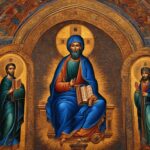St. Gregory the Illuminator, born in the 3rd century in the Kingdom of Armenia, was the founder and first official head of the Armenian Apostolic Church. He is venerated as a saint in several Christian denominations. Gregory played a crucial role in converting Armenia from Zoroastrianism to Christianity, making it the first state to adopt Christianity as its official religion. His life and teachings continue to inspire millions of people and his legacy is celebrated to this day.
Key Takeaways:
- St. Gregory the Illuminator was the founder and first official head of the Armenian Apostolic Church.
- He played a crucial role in converting Armenia to Christianity, becoming the first state to adopt it as its official religion.
- Gregory’s teachings and legacy continue to inspire millions of people.
- He endured challenges and criticisms but remained steadfast in his faith and commitment to spreading Christianity.
- Gregory’s profound impact on Armenia’s religious and cultural identity earns him a place of reverence and admiration.
Early Life and Background
Gregory, the esteemed Armenian saint also known as St. Gregory the Illuminator, had a remarkable journey that shaped his profound influence on the Christian faith in Armenia. Born as the son of a Parthian nobleman named Anak, Gregory was raised as a Christian in Caesarea of Cappadocia. However, his early life took a tumultuous turn when he was forced to flee Armenia to escape the invasion by the Persians.
During his time in exile, Gregory sought education in Greece, where he deepened his knowledge and devotion to Christianity. His thirst for knowledge and spiritual enlightenment guided him back to Armenia in his adulthood, where he embarked on a fateful mission that would change the course of history.
Gregory’s return to Armenia aligned with the reign of King Tiridates III, a ruler whose pagan beliefs clashed with Gregory’s unwavering faith. The clash reached its tipping point when Gregory refused to participate in a pagan sacrifice, leading to his imprisonment and unimaginable torture. Through the cruel ordeal, Gregory’s true identity was revealed – he was the son of Anak, the killer of the previous Armenian king, Khosrov II.
In a dramatic turn of events, Gregory was cast into a pit called Khor Virap, where he endured confinement for a staggering 14 years. Miraculously, he survived the treacherous conditions, and this momentous chapter in his life became a crucial catalyst for the spiritual transformation of Armenia.
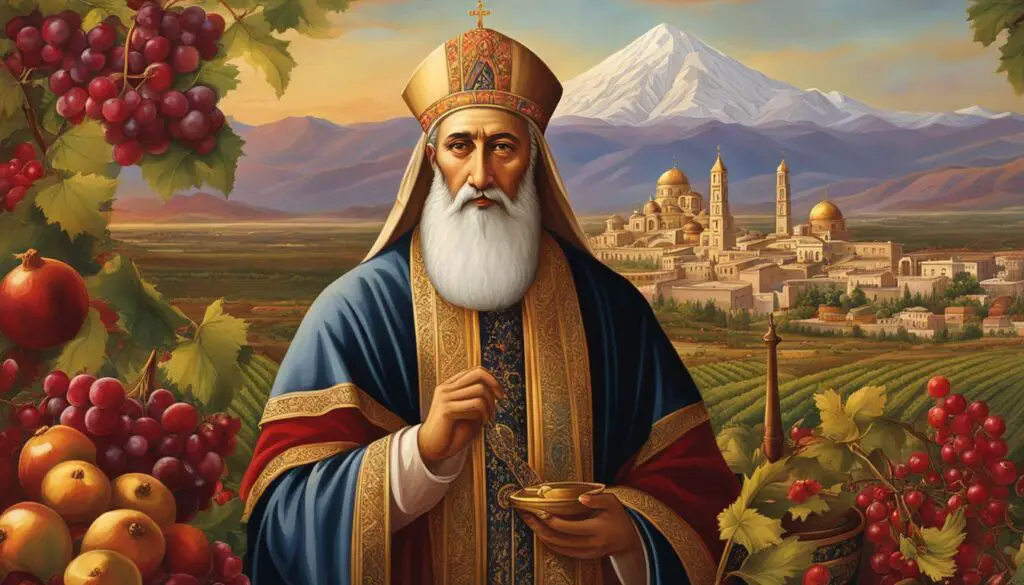
Call to Religious Life
After his release from the pit, St. Gregory the Illuminator made a profound decision to dedicate his life to serving God and spreading the Christian faith. Fueled by his unwavering belief in Christ, Gregory embraced a new calling as a bishop and commenced his mission to establish churches throughout Armenia.
Driven by a deep devotion to God, Gregory the Illuminator quickly emerged as a revered religious figure in Armenia. His commitment to his faith and the principles of Christianity shaped the very foundation of the Armenian Church, playing a pivotal role in its establishment and development.
Undeterred by the challenges that lay ahead, Gregory labored tirelessly to cultivate a flourishing spiritual community across the land. With every church he built, he sowed the seeds of love, compassion, and reverence for God, leaving an indelible mark on the Armenian religious landscape.
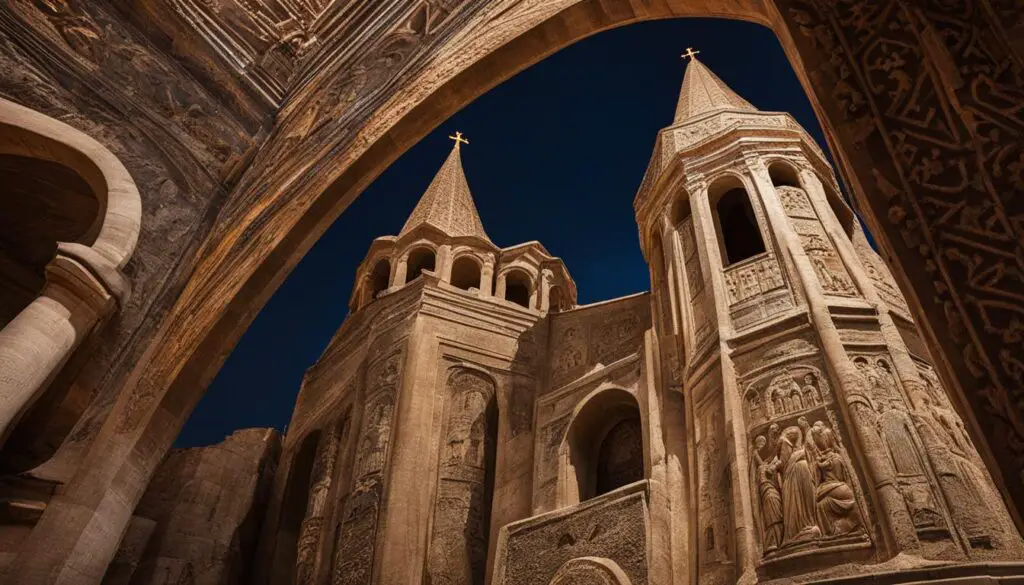
Armenian Apostolic Church
The establishment of the Armenian Apostolic Church, under the guiding hand of St. Gregory the Illuminator, laid the groundwork for a rich religious tradition that endures to this day. The churches he founded became sanctuaries of worship, centers of community, and beacons of spiritual enlightenment.
Gregory’s vision for the Armenian Church extended beyond the mere construction of physical structures. He sought to instill profound spiritual values in the hearts and minds of its followers, fostering a deep connection with God and providing spiritual guidance for generations to come.
The Teachings and Legacy of Gregory the Illuminator
Gregory’s teachings and his legacy as a religious leader continue to shape the spiritual lives of Armenians and Christians worldwide. His unwavering faith, self-sacrifice, and commitment to God serve as inspiration for believers, urging them to embrace their own callings and forge a meaningful relationship with the divine.
The foundation laid by St. Gregory the Illuminator has resulted in a vibrant and influential Armenian Apostolic Church, contributing significantly to the religious and cultural identity of Armenia. His examples of compassion, forgiveness, and spiritual resilience continue to inspire devotees, reminding them of the enduring power of faith.
| Establishment of the Armenian Apostolic Church | Legacy and Influence |
|---|---|
| ✓ Built churches throughout Armenia | ✓ Shaped the spiritual lives of Armenians |
| ✓ Fostered a sense of community and worship | ✓ Inspirational teachings for believers worldwide |
| ✓ Instilled profound spiritual values | ✓ Enduring influence on Armenian culture |
Work
St. Gregory the Illuminator’s work as a bishop and religious leader had a profound impact on Armenia. His achievements as a historical figure are a testament to his unwavering dedication and tireless efforts in spreading the Christian faith.
One of his significant accomplishments was the conversion of King Tiridates III to Christianity. This pivotal moment marked the beginning of the nation’s transformation, as Gregory went on to oversee the conversion of the entire nation of Armenia. His persuasive teachings and profound faith led many people to embrace Christianity.
In his mission to establish Christianity, Gregory played a key role in the destruction of pagan temples and the construction of Christian churches in their place. This symbolized the triumph of the new faith over the old, pagan beliefs. Gregory’s commitment to the cause was unwavering, and his actions paved the way for the spread of Christianity throughout the region.
Recognizing the importance of education in nurturing the faith, Gregory established schools for the education of children in the Christian doctrine. Through these institutions, he ensured that future generations would continue to uphold and promote the teachings of Christ.
Gregory’s impact was not limited to his own efforts alone. He ordained bishops to carry on his work, establishing a strong foundation for the growth of the Church in the years to come. His vision and leadership continue to inspire countless individuals to this day.
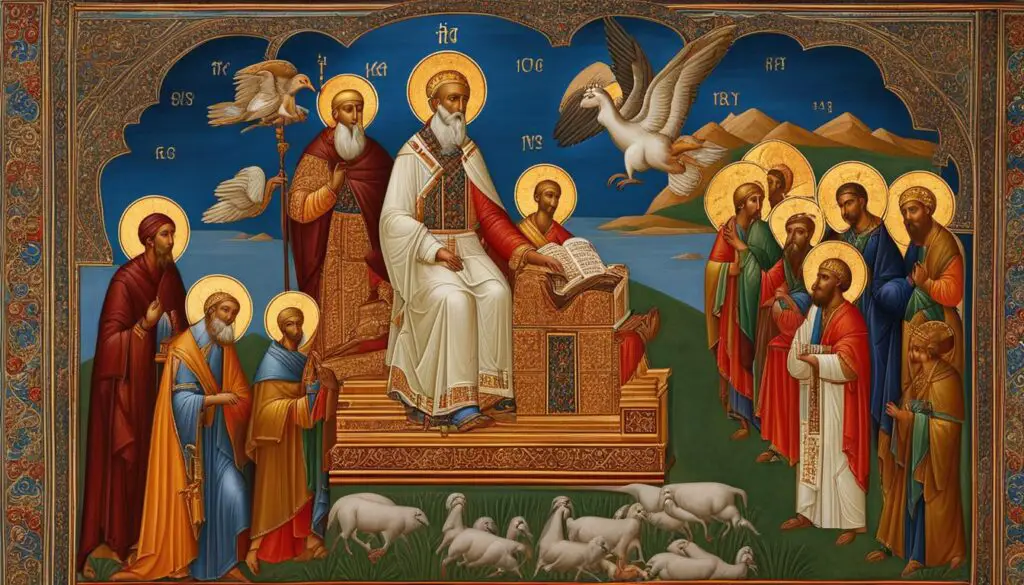
In summary, St. Gregory the Illuminator’s achievements as a historical figure cannot be understated. His conversion of King Tiridates III and the entire nation of Armenia, the destruction of pagan temples, the establishment of Christian churches and schools, and the ordination of bishops are all testament to his dedication and impact as a religious leader. Gregory’s work laid the foundation for the spread and growth of Christianity in Armenia, earning him the well-deserved title of “the Illuminator.”
Spiritual Life and Philosophy
St. Gregory the Illuminator’s spiritual life was deeply rooted in his unwavering faith in God and his relentless commitment to living a righteous and holy life. His teachings offer profound insights into the essential aspects of building a strong and meaningful relationship with God.
“Prayer is the nourishment of the soul, the lifeline that connects us to the divine. It is through prayer that we seek guidance, find solace, and forge a deep communion with our Creator.”
Gregory emphasized the importance of prayer as a fundamental practice for fostering spiritual growth and connection with God. He believed that through prayer, individuals could seek guidance, find inner peace, and experience divine intervention in their lives.
Repentance was another cornerstone of Gregory’s philosophy. He taught that true repentance involves acknowledging one’s mistakes, seeking forgiveness, and committing to a transformative process of change and growth. By embracing repentance, individuals could find redemption and reconcile with God.
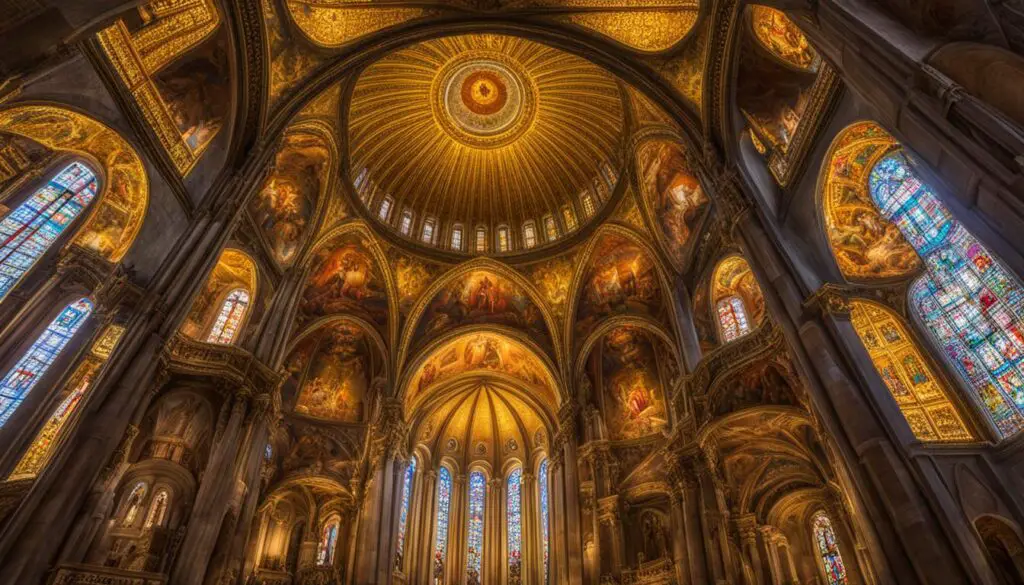
“Forgiveness is the key to unburdening the heart and finding true freedom. As we forgive others, we release ourselves from the chains of resentment and open the door to healing and reconciliation.”
Gregory emphasized the transformative power of forgiveness, teaching that it not only fosters reconciliation but also liberates individuals from the burdens of anger and resentment. He believed that through forgiveness, individuals could experience profound healing and restoration.
The Role of the Church in Salvation
Gregory placed great importance on the role of the Church in guiding individuals towards salvation. He believed that the Church serves as a spiritual anchor, providing guidance, support, and a sense of community for believers.
“The Church is the sanctuary where souls find refuge and nourishment. It is the beacon of light that illuminates the path to salvation.”
Gregory viewed the Church as a divine institution ordained by God to guide believers in their spiritual journey. He emphasized the significance of active participation in the life of the Church, including regular attendance of worship services, partaking in the sacraments, and engaging in acts of service and charity.
Through his teachings, St. Gregory the Illuminator conveyed a profound understanding of spirituality and guided generations of believers towards a closer relationship with God. His spiritual insights continue to shape the Armenian Church and inspire followers to this day.
Challenges and Criticisms
Despite his significant achievements, St. Gregory the Illuminator faced several challenges and criticisms during his lifetime. His unwavering dedication to his faith in Christianity often put him at odds with those who adhered to pagan rituals and beliefs. Gregory endured persecution and torture for his refusal to participate in these ceremonies, remaining steadfast in his conviction.
Some individuals questioned Gregory’s authority and criticized his efforts to dismantle pagan temples. They viewed his actions as a threat to their religious traditions and customs. However, Gregory remained undeterred, believing that the spread of Christianity was the path to salvation.
“I will not bow before false gods, nor will I forsake my belief in the one true God,” Gregory proclaimed in the face of opposition.
Despite the challenges, Gregory continued to spread the message of Christianity, converting many to the faith and establishing churches throughout Armenia. His firm resolve in the face of adversity served as an inspiration to believers and strengthened their faith in the face of opposition.
Gregory’s unwavering commitment to his beliefs and his refusal to compromise his principles is a testament to his character and the impact he had on the development of Christianity in Armenia.
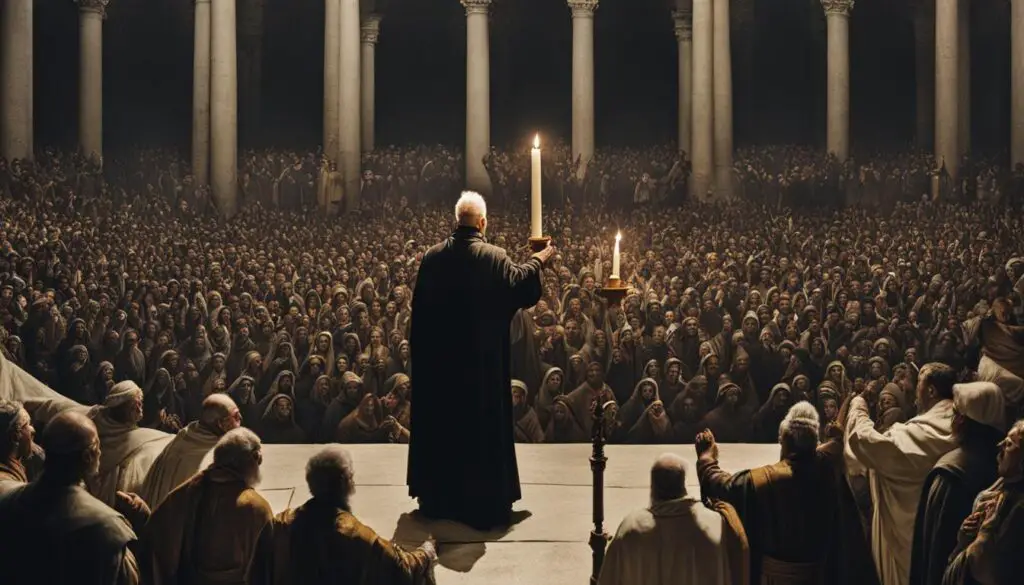
Quotes:
“The path of righteousness is often met with challenges, but it is our unwavering faith that guides us through.”
– St. Gregory the Illuminator
Recognition and Awards
Gregory’s invaluable contributions to the spread of Christianity in Armenia were widely recognized and celebrated. His unwavering dedication and profound impact on the religious and cultural identity of Armenia have earned him a place of reverence and admiration.
“The faith and resilience demonstrated by St. Gregory the Illuminator in his efforts to establish the Armenian Apostolic Church are truly inspiring. Through his leadership and unyielding commitment, he successfully converted Armenia to Christianity, making it the first state to adopt this faith as its official religion.” – Archbishop Michael, Armenian Orthodox Church
Gregory’s journey as the apostle of Armenia was marked by numerous accolades and honors. He was consecrated as the Bishop of Armenia and played a pivotal role in establishing the Armenian Apostolic Church as a strong and enduring institution.
Conversion of Armenia
Gregory’s relentless efforts to convert the nation to Christianity have left an indelible mark on the history of Armenia. With his guidance and teachings, Armenia became the first state in the world to embrace Christianity as its official religion.
His unwavering faith, accompanied by his unwavering commitment, led to the construction of numerous churches and the destruction of pagan temples throughout the country. Gregory’s evangelistic work forever changed the religious landscape of Armenia and solidified its identity as a Christian nation.
A Lasting Legacy
The influence of Gregory’s work continues to shape the spiritual and cultural fabric of Armenia. His dedication and leadership have inspired generations of Armenians to embrace their Christian heritage and live out their faith. Gregory’s exemplary life of service and devotion continues to be celebrated and serves as a powerful testament to the enduring power of faith.
Shrines and Remembrances
To honor the profound spiritual and historical impact of Gregory, shrines dedicated to his memory and the Armenian Apostolic Church have been erected in various locations across Armenia. These sacred spaces serve as gathering points for believers who seek to pay tribute to the apostle and draw strength from his example.
| Shrine Name | Location | Description |
|---|---|---|
| Hripsime Church | Vagharshapat, Armenia | Built on the burial site of Saint Hripsime, one of the early Christian martyrs, this church also honors the legacy of St. Gregory the Illuminator. |
| Etchmiadzin Cathedral | Vagharshapat, Armenia | This majestic cathedral, the mother church of the Armenian Apostolic Church, is considered a vital pilgrimage site for Armenians and an architectural masterpiece. |
| Khor Virap Monastery | Ararat Plain, Armenia | Located atop a hill, this monastery has historical significance as the spot where Gregory was imprisoned in the pit, later emerging as the symbol of his miraculous survival. |
Miracles and Path to Sainthood
Throughout his remarkable life, St. Gregory the Illuminator was closely associated with countless miracles and divine interventions. Legends tell of his extraordinary ability to perform miraculous healings and exorcisms, with his prayers believed to possess great power. These miracles further solidified his reputation as a holy and pious figure.
After his death, St. Gregory the Illuminator was venerated as a saint in the Armenian Apostolic Church and other Christian denominations. His path to sainthood is marked by numerous accounts of miracles attributed to his intercession and his profound spiritual influence on believers. These miracles serve as a testament to his unwavering faith and his close connection with the divine.
“St. Gregory’s miracles have left an indelible mark on the hearts and minds of believers. Countless individuals have witnessed the transformative power of his intercession in their lives, experiencing physical healings, spiritual breakthroughs, and divine interventions. His miracles continue to inspire and strengthen the faith of those who turn to him.”
St. Gregory the Illuminator’s path to sainthood is a testament to the significant impact he had on the lives of countless individuals throughout history. His miracles and profound spiritual influence have established him as a revered saint, embodying the power of faith and the enduring presence of God’s grace.
Legacy and Continuing Influence
St. Gregory the Illuminator’s legacy extends far and wide, resonating not only within Armenia but beyond its borders. His pivotal role in establishing the Armenian Apostolic Church and converting the whole nation to Christianity has left an indelible mark on Armenia’s religious and cultural identity.
Gregory’s teachings on faith, forgiveness, and the significance of the Church continue to inspire believers to this day. His unwavering devotion and commitment to God serve as a guiding light for the Armenian Church and its followers, who look to him as a spiritual guide in their spiritual journey.
“The legacy of St. Gregory the Illuminator is a testament to the power of faith and the indomitable spirit of one dedicated to sharing the message of God’s love and salvation.”
The profound impact of St. Gregory’s work is evident in the numerous churches and shrines dedicated to him, serving as places of worship and pilgrimage for countless believers. His life and teachings continue to shape the religious practices, traditions, and theology of the Armenian Apostolic Church, ensuring that his influence endures for generations to come.
Gregory’s exemplary life of selflessness and resilience has also inspired reflections and personal testimonies from individuals who have sought solace and guidance from his teachings. His wisdom and compassion transcend time, providing comfort and inspiration to those facing challenges and seeking spiritual enlightenment.
In summary, St. Gregory the Illuminator’s enduring legacy as an Armenian saint and religious leader is a testament to his profound impact on the Armenian Apostolic Church and the lives of believers. His teachings and example continue to guide and inspire, fostering a strong sense of faith, devotion, and unity within the Armenian community and beyond.
Conclusion
The life of St. Gregory the Illuminator stands as a testament to the enduring power of faith and conviction. Born in the 3rd century in the Kingdom of Armenia, Gregory dedicated his life to spreading the Christian message and played a pivotal role in the conversion of Armenia from Zoroastrianism to Christianity.
Despite facing persecution and challenges, Gregory’s unwavering commitment to his beliefs inspired generations of believers. Today, his memory is honored in churches and shrines dedicated to his name, where people gather to pay homage to this revered figure. His example continues to guide and inspire Christians around the world, reminding them of the importance of faith and its transformative power.
St. Gregory the Illuminator’s contributions have been recognized through various awards and titles, including his consecration as the bishop of Armenia. His work led to the establishment of the Armenian Apostolic Church and the adoption of Christianity as the official religion of Armenia, making it the first state to do so. His efforts to demolish pagan temples and build Christian churches not only transformed the religious landscape of Armenia but also left a profound cultural impact.
Through numerous miracles attributed to his intercession and his spiritual influence, St. Gregory the Illuminator became a beloved saint in the Armenian Apostolic Church and other Christian denominations. His teachings on prayer, repentance, and forgiveness continue to resonate, and his legacy lives on in the hearts of believers who seek guidance and inspiration. St. Gregory the Illuminator remains a symbol of the enduring power of faith, leaving a lasting legacy that extends far beyond his lifetime.
FAQ
Who was St. Gregory the Illuminator?
St. Gregory the Illuminator was the founder and first official head of the Armenian Apostolic Church. He was born in the 3rd century in the Kingdom of Armenia and played a crucial role in converting Armenia to Christianity.
What is the significance of St. Gregory the Illuminator?
St. Gregory’s conversion of Armenia to Christianity made it the first state to adopt Christianity as its official religion. His life and teachings continue to inspire millions of people, and his legacy is celebrated to this day.
What challenges did St. Gregory face in his lifetime?
St. Gregory endured persecution and torture for refusing to participate in pagan rituals. He also faced criticism for his efforts to dismantle pagan temples. Despite these challenges, he remained steadfast in his faith and continued to spread the message of Christianity.
What was St. Gregory’s role in the establishment of the Armenian Apostolic Church?
St. Gregory became a bishop and established churches throughout Armenia. He converted King Tiridates III to Christianity and oversaw the conversion of the entire nation. He also established schools for the education of children in the Christian faith.
What was St. Gregory’s spiritual philosophy?
St. Gregory emphasized the importance of prayer, repentance, and forgiveness as key aspects of one’s relationship with God. He also emphasized the role of the Church in guiding individuals towards salvation.
What recognition did St. Gregory receive for his work?
St. Gregory was consecrated as the bishop of Armenia and his efforts led to the establishment of the Armenian Apostolic Church. His profound impact on the religious and cultural identity of Armenia earned him the title of “the Illuminator.”
Did St. Gregory perform miracles?
According to legend, St. Gregory performed miraculous healings, exorcisms, and his prayers were believed to have great power. After his death, he was venerated as a saint in the Armenian Apostolic Church and other Christian denominations.
What is St. Gregory’s legacy?
St. Gregory’s role in the establishment of the Armenian Apostolic Church and the conversion of Armenia to Christianity has left an indelible mark on the country’s religious and cultural identity. His teachings on faith, forgiveness, and the importance of the Church inspire believers to this day.


